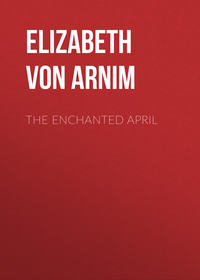 полная версия
полная версияThe Pastor's Wife
And she went out again on tip-toe, softly closing the door and leaving Ingeborg in a state of extreme and active interest and interrogation. "When one has said A one must say B...." Why must one? And what was B? What, indeed, if you came to that, was A?
She listened a moment, raised on her elbow, her bright head more ruffled than ever after its descent into the billows, then she slid down on to the slippery floor and ran across in her stockings to one of the big open windows.
It looked on to a tangle of garden, a sort of wilderness of lilac bushes and syringa and neglected roses and rough grass and hemlock at the back of the house. There was nobody anywhere to be seen, and she got up on to the sill and sat there in great enjoyment, swinging her feet, for it all smelt very sweet at the end of the long hot day, till she thought the hour, the blessed hour, must be nearly over. Then she stole back and rearranged herself carefully on the bed.
"But this is the way of paying calls," she thought, pulling the quilt up tidily under her chin and waiting for what would be done to her next.
CHAPTER XVI
They did not get away till nine o'clock.
There was supper at seven, an elaborate meal, and they sat over it an hour and a half. Then came more coffee, served on the terrace by servants in white cotton gloves, and half an hour later, just before they left, tea and sandwiches and cakes and fruit and beer.
Ingeborg was now quite clear about the reason for her mother-in-law's tears. She saw very vividly how dreadful her behaviour must have seemed. That groaning supper-table, that piling up as the end of the visit drew near of more food and more and more, and the refreshment of bed in the middle....
"I shall invite her all over again," she said suddenly, determined to make amends.
When she said this the carriage had finally detached them from sight and sound of the now quite cordial Glambecks, and was heaving through the sand of the dark wooded road beyond their gate.
"Whom will the Little One invite?" asked Herr Dremmel, bending down. He had got his arm round her, and at the bigger joltings tightened his hold and lifted her a little. His voice was tender, and when he bent down there was an enveloping smell of cigars and wine, mixed with the india-rubber of his mackintosh.
Ingeborg knew that for some reason she could not discover she had made herself popular. There was the distinct consciousness of having suddenly, half way through the visit, become a success. And she was still going on being a success, she felt. But why? Robert was extraordinarily attentive. Too attentive, really, for oh, what a wonderful night of stars and warm scents it was, once they were in the open—what a night, what a marvel of a night! And when he bent over her it was blotted out. Dear Robert. She did love him. But away there on that low meadow, far away over there where a white mist lay on the swampy places and the leaves of the flags that grew along the ditch stood up like silver spears in the moonlight, one could imagine the damp cool fragrance rising up as one's feet stirred the grass, the perfect solitariness and the perfect silence. Except for the bittern. There was a bittern, she had discovered, in those swamps. If she were over there now, lying quite quiet on the higher ground by the ditch, quite quiet and alone, she would hear him presently, solemnly booming.
"Whom will the Little One invite?" asked Herr Dremmel, bending down across the whole of the Milky Way and every single one of all the multitude of scents the night was softly throwing against her face.
He kissed her very kindly and at unusual length. It lasted so long that she missed the smell of an entire clover field.
"Your mother," said Ingeborg, when she again emerged.
"Heavens and earth!" said Herr Dremmel.
"I know now what I did—or rather didn't do. I know now why she kept on saying Bratkartoffel. Oh, Robert, she must have been hurt. She must have thought I didn't care a bit. And I did so want her to be happy. Why didn't you tell me?"
"Tell you what, little sheep?"
"About there having to be supper, and about her having to go to bed."
"To bed?"
"Did the Baron put you?"
"Put me?"
"To bed?"
Herr Dremmel bent down again and looked a little anxiously at as much of her face as he could see in the moonlight. It seemed normal; not in the least flushed or feverish. He touched her cheek with his finger. It was cool.
"Little One," he said, "what is this talk of beds?"
"Only that it would save rather a lot of awful things happening if you would just give me an idea beforehand of what is expected. It wouldn't take a minute. I wouldn't disturb you at your work for anything, but at some odd time—breakfast, for instance, or while you're shaving—if you'd say about beds and things like that. One couldn't guess it, you know. In Redchester one didn't do it, you see. And it's such a really beautiful arrangement. Oh"—she suddenly flung her arms round him and held him tight—"I am glad I married one of you!"
"One of me?"
Herr Dremmel again peered anxiously at her face.
"One of you wonderful people—you magnificent, spacious people. In Redchester we got rid of difficulties by running away. You face them and overcome them. There isn't much doubt, is there, which is the finer?"
He transferred his cigar to the hand that was round her shoulder and spread his right one largely over her forehead. It was quite cool.
"Who," went on Ingeborg enthusiastically, jerking her head away from his hand, "would have a custom that makes calls last five hours without rebelling? You are too splendidly disciplined to rebel. You don't. You just set about finding some way of making the calls endurable, and you hit on the nicest way. I loved that hour in bed. If only I'd known that the other day when your mother came! The relief of it...."
"But my mother—" began Herr Dremmel in a puzzled voice. Then he added with a touch of severity, "Your remarks, my treasure, are not in your usual taste. You forget my mother is a widow."
"Oh? Don't widows?"
"Do not widows what?"
"Go to bed?"
"Now kindly tell me," he said, with an impatience he concealed beneath calm, for he had heard that a husband who wishes to become successfully a father has to accommodate himself to many moods, "what it is you are really talking about."
"Why, about your not explaining things to me in time."
"What things?"
"About your mother having to go to bed."
"Why should my mother have to go to bed?"
"Oh, Robert—because it's the custom."
"It is not. Why do you suppose it is the custom?"
"What? When I've just been put there? And you saw me go?"
"Ingeborg—"
"Oh, don't call me Ingeborg—"
"Ingeborg, this is levity. I am prepared for much accommodating of myself to whims in regard to food and kindred matters, but am I to endure levity for nine months?"
She stared at him.
"You went to bed because you were ill," he said.
"I wasn't," she said indignantly. Did he, too, think she did not know how to control herself in the presence of cake?
"What? You were not?"
There was a note of such sharp disappointment in his voice that in her turn she peered at his face.
"Now kindly tell me, Robert," she said, giving his sleeve a slight pull, "what it is you are really talking about."
"You did not feel faint? You feel quite well? You do not feel ill after all?"
Again the note of astonished disappointment.
"But why should I feel ill?"
"Then why did you ask to be taken home almost before we had arrived?"
For the first time she heard anger in his voice, anger and a great aggrievedness.
"Almost before we'd arrived? We'd been there hours. You hadn't told me a call meant supper."
"Almighty Heaven," he cried, "am I to dwell on every detail of life? Am I personally to conduct you over each of the inches of your steps? Do you regard me as an elementary school? Can you not imagine? Can you not calculate probabilities? Can you not construct some searchlight of inference of your own, and illuminate with it the outline of at least the next few hours?"
She gazed at him a moment in astonishment.
"Well," she said.
If her father had asked her only one of these questions in that sort of voice she would have been without an answer, beaten down and crushed. But Robert had not had the steady continuous frightening of her from babyhood. He could not hold over her, like an awful rod, that she owed her very existence to him. He could not claim perpetual gratitude for this remote tremendous gift, bestowed on her in the days of her unconsciousness. He was a kindly stranger appointed by the Church to walk hand in hand with her along the path of grown-up life. He had admired her, and kissed her, and quite often during their engagement had abased himself at her feet. Also she had seen him at moments such as shaving.
"I believe," she said after another astonished pause, "that you're scolding me. And you're scolding me because you're angry with me, and you're angry with me—Robert, is it possible you're angry with me because I'm not ill?"
He threw away his cigar and seized her in his arms and began to whisper voluminously into her ear.
"What?" she kept on saying. "What? You're tickling me—what? I can't hear-"
But she did in the end hear, and drew herself a little back from him to look at him with a new interest. It seemed the oddest thing that he, so busy, so nearly always somewhere else in thought, so deeply and frequently absent from the surface of life, so entirely occupied by his work that often he could hardly remember he had a wife, should want to have yet another object of the kind added unto him, a child; and that she who lived altogether on the surface, who knew, as it were, the very taste of each of the day's minutes and possessed them all, who never lost consciousness of the present and never for an instant let go of her awareness of the visible and the now, should be without any such desire.
"But," she said, "we're so happy. We're so happy as we are."
"It is nothing compared to what we would be."
"But I haven't even begun to get used to this happiness yet—to the one I've got."
"You will infinitely prefer the one that is yet to come."
"But Robert—don't rush me along. Don't let us rush past what we've got. Let us love all this thoroughly first-"
He looked at her very gravely. "We have now been married two months," he said. "I become anxious. To-night—I cannot tell you how glad I was. And then—it was nothing after all."
She gazed at him with a feeling of a new incumbency. He had said the last words in a voice she did not know, with a catch in it.
"Robert—" she said quickly, putting out her hand and touching his with a little soft stroking movement.
She wished above all things to make him perfectly happy. Always she had loved making people happy. And she was so grateful to him, so grateful for the freedom she had got through him, that just her gratitude even if she had not loved him would have made her try to do and be everything he wished. But she did love him. She certainly loved him. And here was something he seemed to want beyond everything, and that she alone could provide him with.
He turned his head away; and as he did this did she see something actually glistening in his eyes, glistening like something wet?
In an instant she had put her arms round him. "Of course I do—of course I want one," she said, rubbing her cheek up and down his mackintosh, "some—heaps—of course we'll have them—everybody has them—of course I'll soon begin—don't mind my not having been ill to-night—I'm so sorry—I will be ill—dear Robert—I didn't know I had to be ill—but I will be soon—I'm sure I will be—I—I feel quite like soon being ill now—"
He patted her face, his face still turned away. "Good little wife," he said; "good little wife."
She felt nearer to him than she had ever felt, so close in understanding and sympathy. She had seen tears, a man's tears. Of what tremendous depths of feeling were they not the signal? The sentence, A strong man's tears, floated up from somewhere and hung about her mind. She pressed him to her in a passion of desire to make him altogether happy, to protect him from feeling too much. She held him like that, her cheek against his arm, rubbing it up and down every now and then to show how well she understood, till they got home. When he lifted her down from the carriage at their door she slipped her hand round the back of his neck and kept it there a moment with the tenderest lingering touch.
"Dear Robert," she whispered, her lips on his ear while he lifted her down; and implicit in the words was the mother-assurance, the yearning mother-promise, "Oh, little thing, little man thing, I'll take care of you."
She hung about the parlour and the passage while he went, as he said, for a moment into his laboratory for a final look round, waiting for him in a strangely warmed exalted state, entirely at one with him, suddenly very intimate, sure that after letting her see things so sacred as tears he would only want to spend the rest of the evening with her, being comforted and reassured, held close to her heart, talking sweetly with her in the quiet dark garden.
But there were six saucerfuls of differently treated last year's rye ready on the laboratory table for counting and weighing. Herr Dremmel beheld them, and forgot the world. He began to count and weigh. He continued to count and weigh. He ended by counting and weighing them all; and it was dawn before, satisfied and consoled for his lost afternoon, it occurred to him that perhaps it might be bedtime.
CHAPTER XVII
The winter came before Ingeborg, after many false alarms due to her extreme eagerness to give Robert the happiness he wanted, was able to assure him with certainty that he would presently become a father. "And I," she said, looking at him with a kind of surprised awe now that it had really come upon her, "I suppose I will be a mother."
Herr Dremmel remarked with dryness that he supposed in that case she would, and refused to become enthusiastic until there was more certainty.
He had been disappointed during the summer so often. Her zeal to meet his wishes made her pounce upon the slightest little feeling of not being well and run triumphantly to his laboratory, daring its locked door, defying its sacredness, to tell him the great news. She would stand there radiantly saying things that sounded like paraphrases of the Scripture, and almost the first German she really learned and used was the German so familiar in every household for being of Good Hope, for being in Blessed Circumstance.
For some time Herr Dremmel greeted these tidings with emotion and excitement; but as the summer went on, he had become so incredulous that she fainted twice in December before he was convinced. Then, indeed, for nearly a whole day his joy was touching. One cannot, however, keep up such joy, and Ingeborg found that things after this brief upheaval of emotion settled back again into how they were before, except that she felt extraordinarily and persistently ill.
Well, she had had the most wonderful summer; she had got that anyhow tucked away up the sleeve of her memory, and could bring it out and look at it when the days were wet and she felt cold and sick. The summer that year in East Prussia had been a long drought, a long bath of sunshine, and Ingeborg lived out in it in an ecstasy of freedom. Her body, light and perfectly balanced, did wonders of exploration in the mighty forests that began at the north of the Kökensee lake and went on without stopping to the sea. She would get Robert's dinner ready for him early, and then put some bread and butter and a cucumber into a knapsack with her German grammar, and paddle the punt down the lake, tie it up where the trees began, and start. Nothing seemed to tire her. She would walk for miles along the endless forest tracks, just as much suited to her environment, just as harmonious and as much a creature of air and sunshine as the white butterflies that fluttered among the enormous pine trunks. Every now and then, for sheer delight in these things, she would throw herself down on the springy delicious carpet of whortleberries and lie still watching the blue-green tops of the pine-trees delicately swaying backwards and forwards far away over her head against the serene northern sky. They made a gentle sighing noise in the wind. It was the only sound, except the occasional cry of a woodpecker or the cry, immensely distant, of a hawk.
Nobody but herself seemed to use the forests. It was the rarest thing that she met a woodman, or children picking whortleberries. When she did she was much stared at. The forests were quite out of the beat of tourists or foreigners, and the indigenous ladies were too properly occupied by indoor duties to wander, even if they liked forests, away from their home anchorage; and for those whose business sent them into these lonely places to come across somebody belonging to the class that can have dinner every day regularly in a house if it likes and to the sex that ought to be there cooking, it was an amazement.
The young lady, however, seemed so happy that they all smiled at her when she looked at them. They supposed she must be some one grown white in a town, and come to stay the summer weeks with one of the Crown foresters. That would explain her detachment from duty, her knapsack, and the colour of her skin. Anyhow, just her passing made their dull day interesting; and they would watch her glinting in and out of the trees till at last, hardly distinguishable from one of the white butterflies, the distance took her.
When she was quite hot she would sit down in a carefully chosen spot where, if possible, a deciduous tree, a maple or a bird cherry, splashed its vivid green exquisitely against the peculiar misty bloom of pink and grey that hung about the pine trunks, a tree that looked quite little down among these giants, hardly as if it reached to their knees, and yet when she stood under it it was almost as big as the lime-trees in the Kökensee garden. She did not sit in its shade; she went some distance away where she could look at it quivering in the light, and leaning her back against a pine-tree she would eat her bread and cucumber and feel utterly filled with the love and glory of God.
Impossible to reason about this feeling. It was there. It seemed in that summer to go with her where-ever she went and whatever she did. She walked in blessing. It was in the light, she thought, looking round her, the wonderful light, the soft radiance of the forest; it was in the air, warm and fresh, scented and pungent; it was in the feel of the pine needles and the dry crisp last year's cones she crushed as she went along; it was in the cushions of moss so green and cool that she stopped to pat them, or in the hot lichen that came off in flakes when her feet brushed a root; it was in being young and healthy and having had one's dinner and sitting quiet and getting rested and knowing the hours ahead were roomy; it was in all these things, everywhere and in everything. She would pick up her German grammar in a quick desire to do something in return, something that gave her real trouble—shall one not say somehow Thank you?—and she engulfed huge tracts of it on these expeditions, learning pages of it by heart and repeating them aloud to the pine-trees and the woodpeckers.
When the sun began to go down she set out for home, sometimes losing her way for quite a long while, and then she would hurry because of Robert's supper, and then she would get very hot; and the combined heat and hurry and cucumber, to which presently was added fatigue, would end in one of those triumphal appearances later on in his laboratory to which he was growing so much accustomed.
In January, when she was just a sick thing, she thought of these days as something too beautiful to have really happened.
There was from the first no shyness about her on the subject of babies. She had not considered it during her life at home, for babies were never mentioned at the Palace—of course, she thought, remembering this omission, because there were none, and it would be as meaningless to talk about babies when there were none as it would be in Kökensee to talk about bishops when there were none. She arrived, therefore, at Kökensee with her mind a blank from prejudice, and finding the atmosphere thick with babies immediately with her usual uninquiring pliability adopted the prevailing attitude and was not shy either.
The neighbourhood did not wait till they were born to talk about its own children. It did not think of its children as unmentionable until they had been baptised into decency by birth. They were important things, the most important of all in the life of the women, and it was natural to discuss them thoroughly. The childless woman was a pitied creature. The woman who had most children was proudest. She might be poor and tormented by them, but it was something she possessed more of than her neighbours. Ilse had early inquired which room would be the nursery. That obvious pattern of respectability, Baroness Glambeck, talked of births with a detail and interest only second to that with which she talked of deaths. It seemed to her a most proper topic of conversation with any young married woman; and on her returning the Dremmel call a fortnight after it had been made she was quite taken aback and annoyed to find it had become irrelevant owing to Ingeborg's being perfectly well.
Indeed, this failure of Ingeborg's entirely spoilt the visit. The Baroness, who had arrived friendly, withdrew into frost with the manner of one who felt she had been thawed on the last occasion on false pretences. Impossible to meet one's pastor's wife—and such an odd-looking and free-mannered one, too—with any familiarity except on the Christian footing of impending birth or death. A pastor's wife belonged to the class one is only really pleasant with in suffering or guilt. Offended, yet forced to continue the call, the Baroness confined such conversation as she made to questions that had a flavour of hostility: where was it possible to get such shoes, and did the Frau Pastor think toes so narrow good for the circulation and the housework?
Ingeborg could not believe this was the motherly lady who had fussed round her bed that day at Glambeck. She felt set away at a great distance from her, on the other side of a gulf. For the first time it was borne in upon her that her marriage made a difference to her socially, that here in Germany the gulf was a wide one. She was a pastor's wife; and when asked about her family, which happened early and searchingly in the call, could only give an impression of more pastors.
"Ah, that is the same as what we call superintendent," said the Baroness, nodding several times slowly on learning that Ingeborg's father was a bishop; and after a series of questions as to the Frau Pastor's sister's marriage nodded her head slowly several times again, and informed Ingeborg that what her sister had married was a schoolmaster. "Like Herr Schultz," said the Baroness—Herr Schultz being the village schoolmaster.
There was a photograph of Judith on the table that caught and kept the Baroness's eye and also, in an even greater but more careful degree, the Baron's. It was Judith dressed in evening beauty, bare-necked, perfect.
Ingeborg took it up with a natural pride in having such a lovely thing for her very own sister and handed it to the Baroness.
"Here she is," said Ingeborg, full of natural pride.
The Baroness stared in real consternation.
"What?" she said. "This is a schoolmaster's wife? This is our pastor's sister-in-law? I had thought—"
She broke off, and with a firm gesture put the photograph on the table again and said she could not stay to supper.
Since then there had been no intercourse with Glambeck, and the Baroness did not know of the satisfactory turn things had taken at the parsonage till on Christmas Eve, from her gallery in church to which she and the Baron had decided to return on the greater festivals as a mark of their awareness that Herr Dremmel desired to make amends, she beheld during the drawn-out verses of the chorale Ingeborg drop sideways on the seat in her pew below and remain motionless and bunched up, her hymn-book pushed crooked on the desk in front of her, and her attitude one of complete indifference to appearances.









